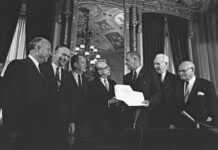
With eight months until the November 2024 elections, the poll shows that Black women have top concerns about a broad range of issues, but the top issues for Black women voters are inflation, the cost of living and affordable housing.
“These critical issues impact Black women’s everyday lives. Black women want economically thriving, education-rich, healthy, and safe communities. Our poll shows that cost, not the economy, drives Black women’s issue priorities. This is in our face every day when we go to the grocery store, put gas in our tanks, and pay our rent and mortgages,” said Glynda C. Carr, President & CEO of Higher Heights Leadership Fund. These issues should be the focus of Congress, our elected leaders, and candidates vying for our votes this November.”
Other key findings of the poll include:
- Though Black women voters strongly believe in the power of their vote, there is a clear concern for the direction of the country and the upcoming elections. Over three-quarters of Black women voters describe their vote as powerful (76%), but 29% of Black women voters believe their voter power is decreasing as we get closer to the November 2024 election.
- Heading into the 2024 elections, Black women voters are most worried about inflation, the cost of living and affordable housing. Despite public safety and gun violence rising to the top as a general concern for the country, Black women voters are most personally worried about how economic issues are impacting their families and communities. That said, racial profiling by police is a top non-economic concern.
- Abortion continues to be a galvanizing and mobilizing issue among Black women voters. Over 40% of Black women (say that they are more likely to vote for a candidate who is “pro-reproductive freedom” (more than 35% who say it would not make a difference.) This finding holds true across age, education, and political party.
- Though Black women voters clearly feel the increase in Black elected representation, there is a persistent feeling of underrepresentation that can decrease morale. Despite the fact that 58% of Black women voters believe they are underrepresented in political power, most are still hopefully optimistic about the representational power they do have. Nearly 81% of Black women voters believe that Black women elected officials have the power to effect change in their communities.
- Generational divide among Black women could impact their political participation. Voters age 18-49 are less trusting of institutions in general – they are less likely to feel they have political power, less likely to trust the Democratic Party will make a difference in their lives, and less likely to trust the media and news sources they see.
Higher Heights for America, a 501(c)(4), and its sister organization Higher Heights Leadership Fund, a national 501(c)(3) organization are building the political power and leadership of Black women from the voting booth to elected office and creating the environment for Black women to run, win and lead. For additional information, please visit https://www.
Contact
Aprill Turner
aprill@






